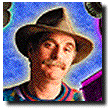
|
|
Here are
a few people to talk to about the menace of Cyberspace: the
Alzheimer's caregiver afraid to leave the house who dials in nightly to a
support group; the bright student in a one-room Saskatchewan school house
researching a paper four hours from the nearest library; the suicidally
depressed gay teenager; AIDS patients sharing the latest treatment
information; political activists using the Net to report, persuade, inform; and
the disabled, ill and elderly, whose minds are alive but who can't
leave their beds. For them and for potentially millions of others like them,
Cyberspace is a not just a lifeline, it can be better than the offline world.
People who have never been online have a picture of what happens there that is almost certainly wrong. Blame that on the mass media's lurid coverage. Do people deceive and steal and snoop and solicit online? Yes, of course. Pornography and pedophilia? I'm sure. But is there pornography and pedophilia in any American city? Of course there is. Is that all there is? Of course not; there's the totality of human existence, high and low. The same is true for Cyberspace. During my 10 years online, I've danced at three weddings of people who met online. I've spoken at three funerals of people I encountered there. At bottom, Cyberspace is about people, not about machines and wires. And what the people who use it do after they find each other is a human phenomenon, not electrical engineering. Consider Phil, a mainstay of the online parenting conference at The WELL, who revealed one night four years ago that his son, known to all of us from the summer picnics and baseball games out in the real world, had been diagnosed with leukemia. Within minutes, a support group organized itself online. Someone on the network, Phil quickly learned, always seemed to be awake and willing to read a father's late-night anxieties. Two were physicians. And two were long-term adult survivors of the same disease. Anyone who wants to preach that Cyberspace is cold and alienating is invited to argue that proposition with Phil and his family. And I remember KJ, a strong and often abrasive online voice who announced two summers ago that she was going to die by August. The messages of support that poured online brought many real-world tears. But tears are cheap. In private e-mail, more than a dozen of us organized a visitation schedule. We sat with her, read to her, just kept her company. She did die that summer. But she did not die alone. Who dares declare KJ's dying to be inauthentic, because the people who helped her die had met her online and knew her first and best there? It doesn't take an engineering degree to understand the power of computer networks: Plug your machine into a phone line and you get a radically new medium. How far that will take us is conjecture. "With networked computers," MIT professor Sherry Turkle writes in "Life On the Screen: Identity in the Age of the Internet," "people are creating alternative identities, forming disembodied relationships and building imaginary places that are beginning to interest and involve us as much as those in the physical world." My computer screen will never look quite the same again. It's no accident that the First Amendment to the United States Constitution protects the rights of citizens to communicate. We now have a medium of communication that might shift some of the power to inform and persuade from the mass media to the grass roots. Let's not lose it through ignorance and misinformation. If we do, Cyberspace could indeed become that cold place the scaremongers proclaim. Online technology is a tool that can build and exercise the power of citizens. But it is up to us to use the tools before we lose them.
|
